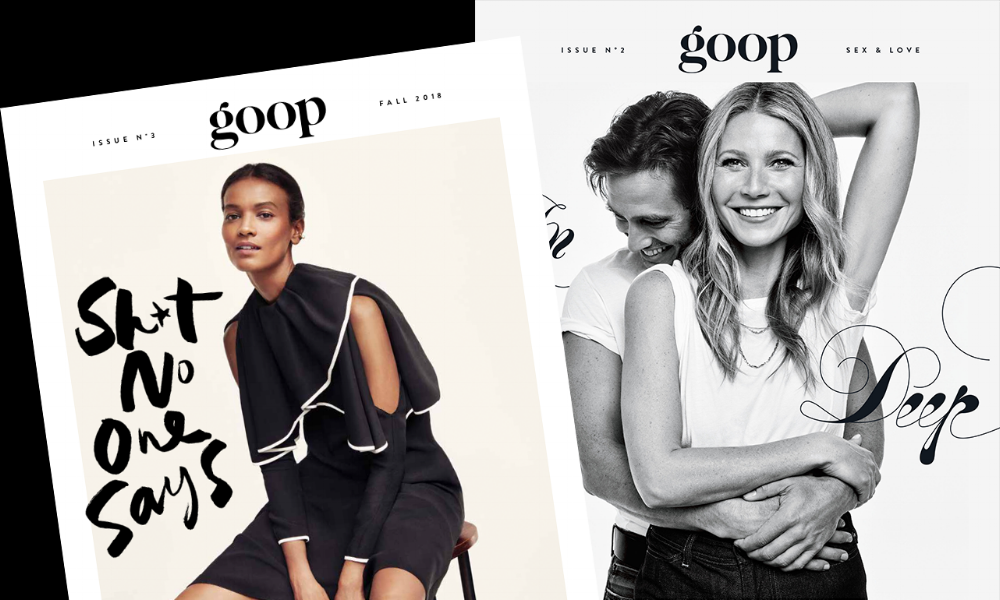Gwyneth Paltrow’s wellness empire cannot catch a break. After agreeing to pay nearly $150,000 last month in order to settle in a lawsuit asserting that it made unsubstantiated claims about the benefits of its products, Goop is the subject of a recently-filed complaint in which a British non-profit points to 113 examples of advertising by Goop that allegedly run afoul of the law.
According to the complaint filed by The Good Thinking Society with the British Advertising Standards Authority (ASA”), a national advertising watchdog, and the National Trading Standards, a group of local government heads from England and Wales that are tasked with investigate commercial organizations, Goop is giving “potentially dangerous” advice related to the “unproven” health benefits of its “wellness products.” In particular, The Good Thinking Society alleges that many products sold by Goop are being advertised in a “misleading” manner, and as a result, could encourage customers to “use products which could cause direct harm.”
One such product, The Mother Load – which is a supplement that will set expecting mothers back $75 per month – boasts “69 percent of the daily value for pregnant women.” But as CNBC states, “Britain’s National Health Service and the World Health Organization [warn] against taking supplements containing vitamin A during pregnancy.” In fact, the British NHS website recommends pregnant women actually “avoid taking supplements that contain vitamin A.”
Of the questionable supplement, Dr. Susan Beck, Senior Vice President of Science and Research at Goop (who is not a medical doctor, but instead, received her PhD in Philosophy and Nutritional Science from Union Institute & University, according to her LinkedIn), told CNBC on Monday, “When used as recommended, Goop’s The Mother Load supplements are safe during pregnancy.”
According to Laura Thomason, a project manager at the Good Thinking Society, “It is shocking to see the sheer volume of unproven claims made by Gwyneth Paltrow’s Goop about their products, especially given that some of their health advice is potentially dangerous … Just because Gwyneth has an Academy Award, it does not mean that Goop should be given an easy ride compared to other big corporations.”
Ms. Thomason further asserted, “If Gwyneth Paltrow cannot provide satisfactory evidence behind the claims she makes for her products, she should not be making those claims.”
While Goop – which according to a New York Times profile on Paltrow did not have fact checkers on staff until last month – said on Monday that it has not been contacted by either the ASA or the National Trading Standards, a spokesperson for the ASA confirmed on Monday that it is, in fact, “looking into a number of ads appearing in various places, including online. At this point we are assessing the complaints and no investigation has been launched at this stage.”
The Good Thinking Society’s complaint alleges that Goop has running afoul of Britain Code of Non-broadcast Advertising, Sales Promotion and Direct Marketing (“CAP Code”), which requires that “before submitting marketing communications for publication, marketers must ensure that they hold documentary evidence to prove all claims, whether direct or implied, that are capable of objective substantiation.”
The CAP Code specifically requires, among other things, that “medical and scientific claims made about health and beauty products, including weight control products, food supplements and cosmetics, be backed by evidence, where relevant consisting of trials conducted on human subjects.”
As for Goop, in particular, which boasts its practice of providing “cutting-edge wellness advice” and products, the ASA states, “Marketers of health and beauty products wanting to make breakthrough claims about a product or treatment will need to hold a high level of robust evidence and should collate sound data to form a body of evidence.”
Goop either lacks substantiation for at least some of the claims it makes about the effects of its products, according to the complaint, thereby potentially making its claims “materially misleading or likely to [be] materially misleading,” which violates Section 3 of the CAP Code.











